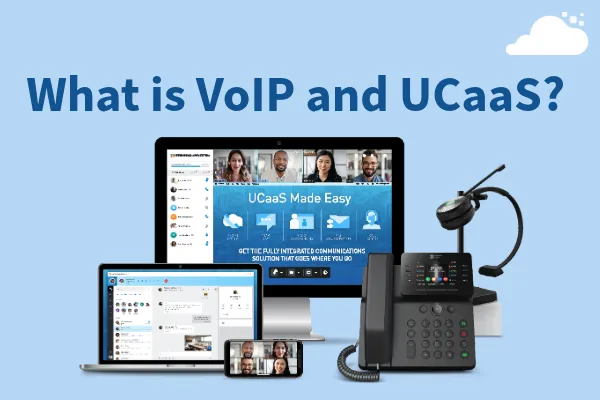
What is VoIP and UCaaS? | Complete Understanding of Business Communications
What is VoIP and UCaaS? Understanding Business Communications for Modern Businesses
The time has come for businesses to no longer be confined to landlines and legacy phone systems. With the rise of remote work, global collaboration, and cloud technology, communication tools have evolved dramatically. Two terms you may hear frequently in this space are VoIP (Voice over Internet Protocol) and UCaaS (Unified Communications as a Service).
But what do they mean, how are they different, and why should your business care? Let’s break it down.
Understanding VoIP
What is VoIP?
VoIP stands for Voice over Internet Protocol, which is simply a technology that allows you to make and receive phone calls using the internet instead of traditional phone lines.
Instead of relying on copper wires or on-site PBX (Private Branch Exchange) hardware, VoIP converts voice into digital signals and transmits them over your internet connection. This makes it more flexible, cost-effective, and scalable than legacy systems.
Key Benefits of VoIP
Cost Savings: Businesses often cut phone bills by 30-50% when switching to VoIP.
Scalability: Adding a new user is as simple as creating an account; no need for additional wiring or hardware.
Flexibility: Employees can make and receive calls from anywhere, whether they’re at their desk, at home, or on the road.
Advanced Features: VoIP often includes voicemail-to-email, call forwarding, call recording, and video integration.
Common Use Cases
Small businesses replacing outdated landlines
Remote teams staying connected from different locations
Customer service departments managing large call volumes
Understanding UCaaS
What is UCaaS?
UCaaS, or Unified Communications as a Service, takes VoIP to the next level. It’s a cloud-delivered platform that integrates multiple communication tools into a single system, including:
Voice (VoIP)
Video conferencing
Instant messaging/chat
Team collaboration
File sharing
Contact center capabilities
Think of UCaaS as the “all-in-one hub” where phone calls, video meetings, and team messaging live in one platform.
Why Businesses Choose UCaaS
Seamless Collaboration: Employees don’t have to juggle between apps for meetings, messaging, and calls.
Supports Remote Work: Whether your team is fully remote, hybrid, or in-office, UCaaS makes communication simple and reliable.
Better Customer Experience: With everything in one system, employees can respond faster and provide more personalized service.
Scalability and Flexibility: Like VoIP, UCaaS grows with your business. Adding features or users is easy.
Example
Picture a sales team: instead of emailing files, texting a colleague, and calling a client on separate platforms, they can do it all in one UCaaS solution. This saves time, reduces missed messages, and keeps the team connected.
VoIP vs. UCaaS: What’s the Difference?
While VoIP focuses on internet-based calling, UCaaS unifies multiple communication methods into one platform.
Here’s a quick comparison:

In short: VoIP is part of UCaaS, but UCaaS is much bigger.
Why Businesses Are Moving from VoIP to UCaaS
Many organizations start with VoIP to save costs and improve flexibility. But as they grow, they realize they need more than just voice; they need integrated communications.
3 Main Reasons for the Shift:
Remote & Hybrid Work: With employees spread out, relying on only phone calls isn’t enough. Teams need video, chat, and collaboration tools.
Customer Expectations: Customers expect fast, multi-channel communication (chat, phone, video). UCaaS enables that.
Productivity Gains: Switching between multiple tools slows teams down. UCaaS streamlines everything.
The Role of UCaaS in Modern Business
UCaaS isn’t just a convenience; it’s becoming essential. According to a Gartner study, Premises-to-cloud migration opportunities will drive pockets of investment growth. Global UC spend is expected to generate a CAGR of 2.4% from 2023 to 2028. Here’s why:
Improved Business Continuity: If the office internet goes down, employees can still connect via mobile apps.
Enhanced Security: Cloud-based providers typically offer stronger encryption, compliance, and data protection than outdated systems.
Better Integration: UCaaS can connect with CRM, ERP, and other business tools for a smoother workflow.
How to Choose Between VoIP and UCaaS
If you’re deciding between VoIP and UCaaS, here are some questions to ask:
Do you only need a reliable phone system?
→ VoIP is a good fit.Do you need video meetings, messaging, and collaboration tools too?
→ UCaaS is the better choice.Do you have remote or hybrid employees?
→ UCaaS ensures seamless communication across locations.Are you looking for scalability and integration with other business systems?
→ UCaaS will support your growth long-term.
Final Thoughts
VoIP and UCaaS are both game-changing technologies for business communication. While VoIP replaces outdated phone systems with a flexible, internet-based solution, UCaaS builds on that foundation by integrating all communication tools into one platform.
For businesses that want to stay competitive, improve customer service, and support modern workstyles, UCaaS is becoming the go-to solution.
If your organization is still relying on traditional phones or a patchwork of communication tools, now is the perfect time to explore what VoIP and UCaaS can do for you.
TCI is here to help, but don’t just take our word for it, take our customers:
"If you're looking to make the transition to VoIP, look no further. Brandon and John offer solutions tailored to your needs and have answers to all your questions. A huge shoutout to Helena for her support in implementing Intermedia Unite at our office. She was incredibly patient in helping users new to VoIP systems get comfortable. Her expertise with VoIP and Intermedia Unite was evident whenever questions or challenges came up. TCI goes above and beyond every step of the way!" – Dylan Dowdy, Century Concrete
Contact us today! We’ll make your transition easy.